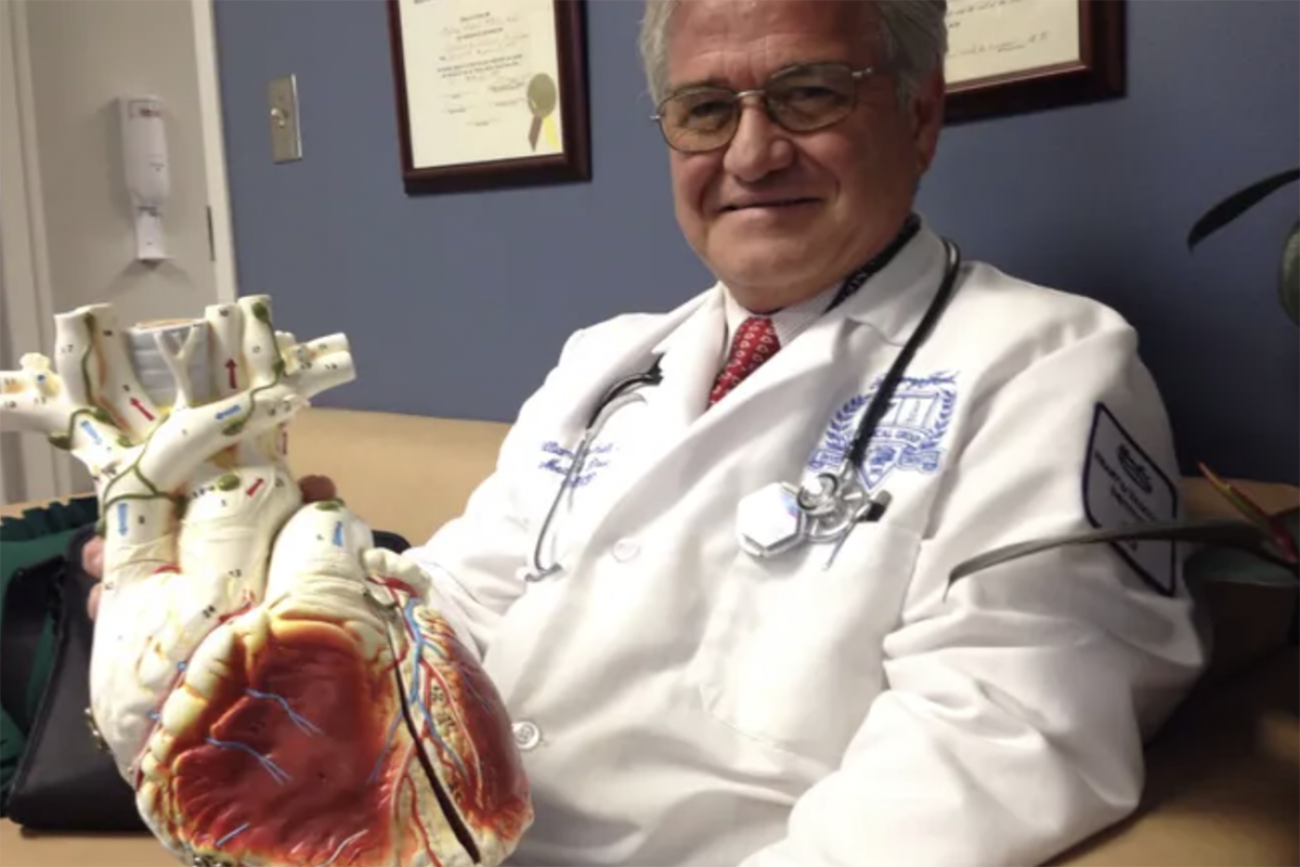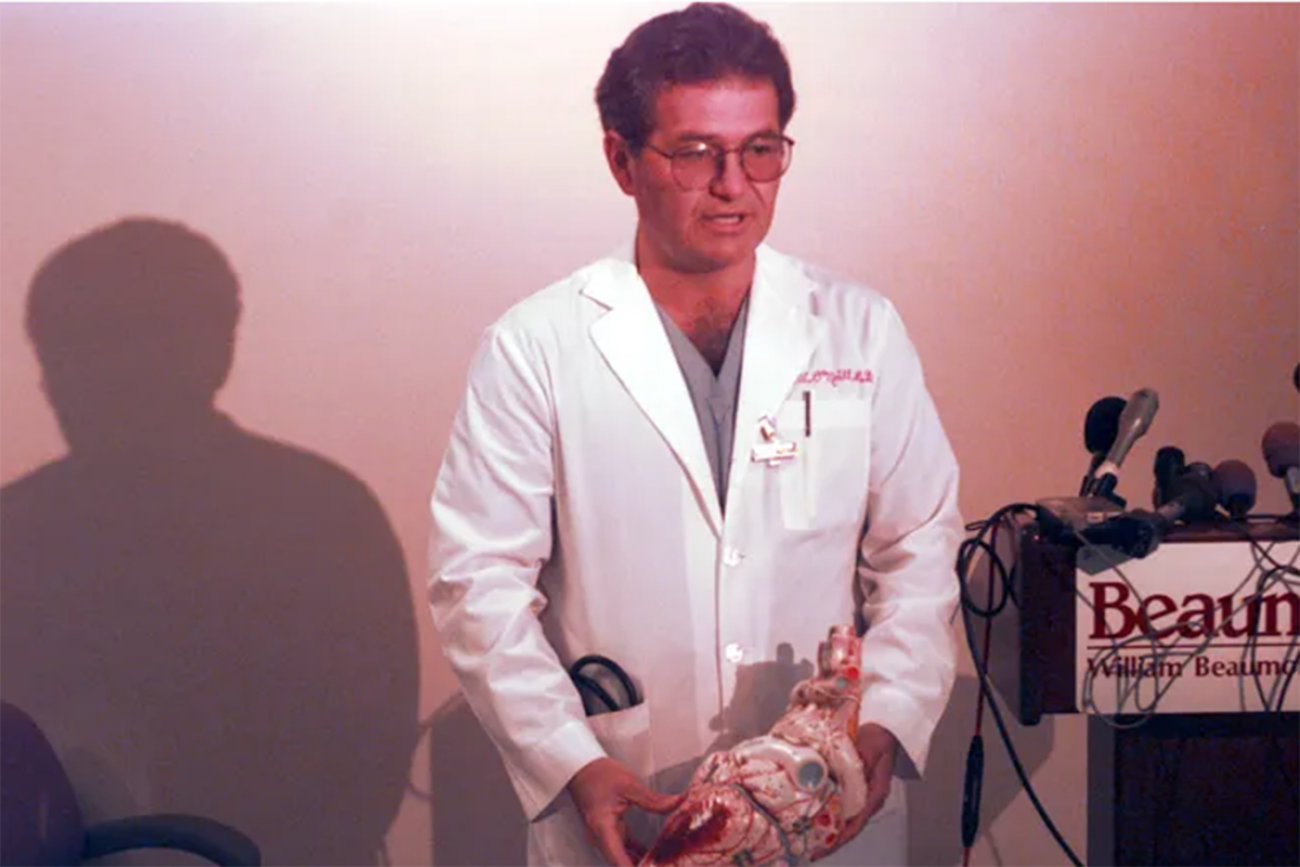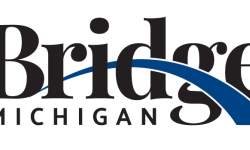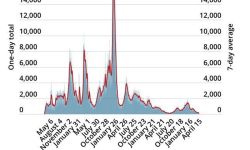Henry Ford doctor, Trump White House tried to pressure FDA into hydroxychloroquine use


Dr. William O'Neill, a star Henry Ford Health cardiologist and medical director, collaborated with Trump White House officials in the summer of 2020 to pressure the U.S. Food and Drug Administration to reverse its stance on hydroxychloroquine as a COVID-19 treatment, newly released documents show.
The documents, made public Wednesday in a report from the House Select Subcommittee on the Coronavirus Crisis, showed that O'Neill worked with senior advisers inside the White House to influence the FDA, in a failed appeal for it to reauthorize hydroxychloroquine even after the agency found the drug was ineffective against COVID-19 and might cause dangerous heart arrhythmias.
After federal regulators revoked the authorization of hydroxychloroquine, documents suggest O'Neill continued to prescribe it off-label to COVID-19 patients. In an email message to his White House contacts, he urged them to help doctors and researchers who "need cover" as they continued to prescribe it.
Related:
- Pfizer seeks approval for COVID shot this fall aimed at Omicron strains
- CDC loosens COVID rules with new onus on people, not schools, businesses
"My guess is some Blue governors like (Michigan Gov. Gretchen) Whitmer Will try to ban its use again!" O'Neill wrote.
Henry Ford Health told the Free Press Wednesday it would review the allegations in the report, including those made about individual physicians "and will take appropriate action."
Stories from the front
Bridge Magazine, Detroit Free Press and Michigan Radio are teaming up to report on Michigan hospitals during the coronavirus pandemic. We will be sharing accounts of the challenges doctors, nurses and other hospital personnel face as they work to treat patients and save lives. If you work in a Michigan hospital, we would love to hear from you. You can contact reporters Robin Erb rerb@bridgemi.com at Bridge, Kristen Jordan Shamus kshamus@freepress.com at the Free Press and Kate Wells katwells@umich.edu at Michigan Radio.
White House adviser backs study
The emails also show O’Neill, who is medical director of Henry Ford's Center for Structural Heart Disease, tried to secure millions of dollars in federal funding through his Trump administration allies to help pay for a Henry Ford research study into the use of hydroxychloroquine to prevent COVID-19 in medical workers and first responders.
He asked: Are "there any resources in the trillions allocated to Covid for a prevention trial? I would be happy to jump thru whatever hoops are required."
O'Neill also suggested that perhaps some of President Donald Trump's "rich supporters would be willing to donate" to help provide the $3 million needed to complete the research.
Dr. Steven Hatfill, an adjunct assistant professor at George Washington University who worked as a senior adviser in the Trump White House, told O'Neill in an email that he could help him secure federal funding for the study.
"HHS has discretionary funding," Hatfill wrote. "I believe-and I know BARDA (Biomedical Advanced Research and Development Authority) has money."
A few days later, Hatfield sent O'Neill a template to apply.
“If you can prepare an initial draft template with timing and funding outlined and get it to me, I will ... suggest changes, you make some changes, a couple quick times back and forth, and it goes to the boss and if he is happy it goes off to BARDA in Trump Time. I’ve seen this process take less than a week."
'NEVER mention the White House together with my name'
The special subcommittee’s report — the second in an investigation of the federal government response to the COVID-19 pandemic — includes 100 previously unreleased emails.
Many of them were written by O’Neill, Hatfill and Peter Navarro, a senior adviser to Trump and director of the White House Office of Trade and Manufacturing Policy.
The documents suggest Navarro and Hatfill tried to obscure White House involvement in the effort to push the FDA to reauthorize hydroxychloroquine as a COVID-19 treatment. The committee released 35 messages from Navarro or Hatfill using private email accounts to correspond — raising questions about whether they violated the Presidential Records Act in the process.
In a message sent from a George Washington University email address, Hatfill told O’Neill not to disclose his ties to the Trump administration.
He admonished O'Neill: “NEVER mention the White House together with my name[.]"
O'Neill quickly repented, writing: "It’s a mistake, you have sensitized me and I won't EVER use your name or the WH again in texts or emails.”
The subcommittee's documents also reveal that other top doctors within the Henry Ford Health system supported O’Neill’s efforts and were aware of his work with Navarro and Hatfill. Among them were Dr. John E. McKinnon, former co-director of Henry Ford's Translational and Clinical Research Center; Dr. Dee Dee Wang, director of structural heart imaging, and Dr. Marcus Zervos, division head for infectious disease.
Leading the charge to study hydroxychloroquine
Headlines from the Free Press archives herald O'Neill as a pioneer in the field of interventional cardiology.
In 1998, he operated on then-Red Wings Coach Scotty Bowman's heart.
O'Neill was among the first doctors in the U.S. to use angioplasty to treat heart attacks and he is credited with performing the nation’s first minimally invasive aortic valve replacement through a catheter when he worked for Beaumont Health in 2003.

When the coronavirus pandemic struck, O'Neill led efforts at Henry Ford to conduct a research study into the use of hydroxychloroquine — historically used to treat lupus and malaria — to determine whether it could also prevent COVID-19 in medical workers and emergency first responders.
At the time, the virus was raging in metro Detroit. Hospitals were beyond capacity, and people were dying. Little was known about the virus, and there were few tests, no vaccines and no known treatments.
President Donald Trump became among hydroxychloroquine's biggest proponents in mid-March 2020, saying during news conferences and on social media that the drug "could be a game changer" in the war against the virus.
Yet there was very little evidence about the effects of hydroxychloroquine in people with COVID-19. A French preprint study that enrolled 36 people was promising but couldn't be used as proof hydroxychloroquine worked because of its small size and questionable methodology.
Emergency use authorization
The subcommittee documents suggest that increasing pressure on the FDA to act in those early days of the pandemic — when so many were desperate for a treatment — was exacerbated by Fox News personality Laura Ingraham, and daytime talk show host Dr. Mehmet Oz piled on.
They pressed the agency to issue an emergency use authorization for hydroxychloroquine and chloroquine to treat some hospitalized coronavirus patients.
On March 28, 2020, the FDA did just that, writing: "There are a few reports of patients with COVID-19 who received these drugs and improved. ... It is not known whether it was the drug that led to the improvement or whether there were other factors involved. We do not know if the treated patients’ condition would have improved without the drug."
Though it granted an EUA, the agency also called for more research. O'Neill heard that call.
He joined Detroit Mayor Mike Duggan at a news conference on April 2, 2020, to announce what became known as the "Will Hydroxychloroquine Impede or Prevent COVID-19" study, or WHIP COVID-19.
"As soon as this virus hit China, there were reports and people were trying to figure out how to treat it," O'Neill said at the time. "There was one interesting report that said that people that were taking this drug hydroxychloroquine or plaquenil ... a common treatment for lupus. ... If they were on that drug, they didn't get infected. So that was like the ... first evidence.
"So, from the scientific side, it looks promising, but not definitive. And we really, really need to know the answer whether or not this drug works."
It wasn't long before evidence began to grow in the medical community that hydroxychloroquine wasn't helping and might even be harmful to some people with coronavirus — causing sometimes fatal heart complications.
Yet on April 9, O'Neill urged Hatfill to begin giving hydroxychloroquine to sailors on the USNS Comfort, which served as a floating hospital in New York Harbor to ease the burden on the city's health care system, which was buckling under the burden of its first COVID-19 surge.
'A prison might be a good place' for a drug trial
He emailed Henry Ford's WHIP COVID-19 study details to Hatfill and wrote: "There is a HUGE risk that sailors on the USS Comfort will be infected while caring for Covid patients."
In a follow-up message, O'Neill wrote: "To assuage concerns about 'scientific proof' we have a control arm ... and can compare our control to your active treatment arm. ... There will be lots of time to analyze after the pandemic is over. NO time to wait for randomized trials."
A few days later, Hatfill sent a message to O'Neill suggesting a randomized hydroxychloroquine study of prisoners at the Westville Correctional Facility in Indiana, which was in the midst of a coronavirus outbreak.
"The prison might be a good place for a clinical prophylaxis trial — certainly the test subjects are not going anywhere and it could be made a double blind study."
See what new members are saying about why they donated to Bridge Michigan:
- “In order for this information to be accurate and unbiased it must be underwritten by its readers, not by special interests.” - Larry S.
- “Not many other media sources report on the topics Bridge does.” - Susan B.
- “Your journalism is outstanding and rare these days.” - Mark S.
If you want to ensure the future of nonpartisan, nonprofit Michigan journalism, please become a member today. You, too, will be asked why you donated and maybe we'll feature your quote next time!



